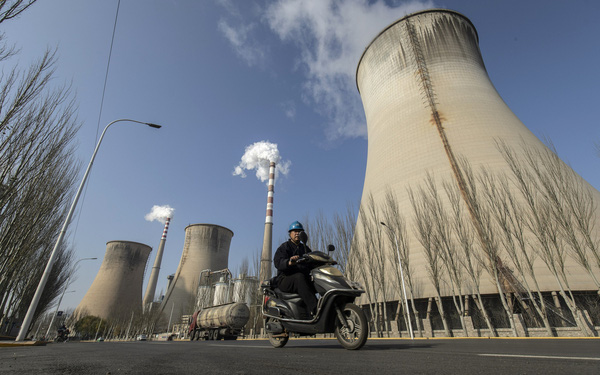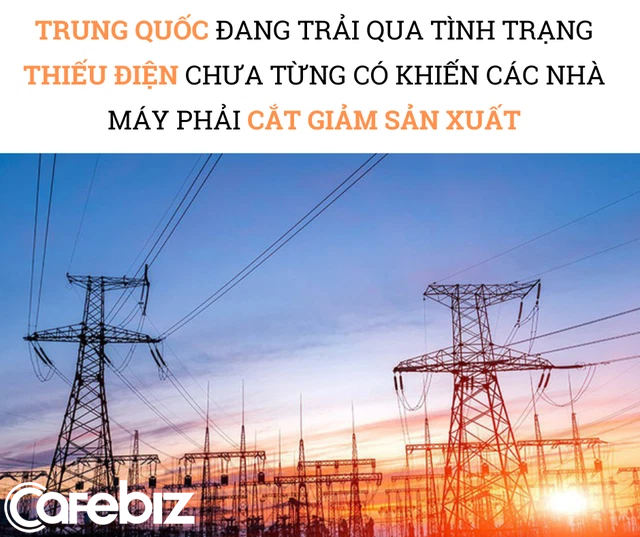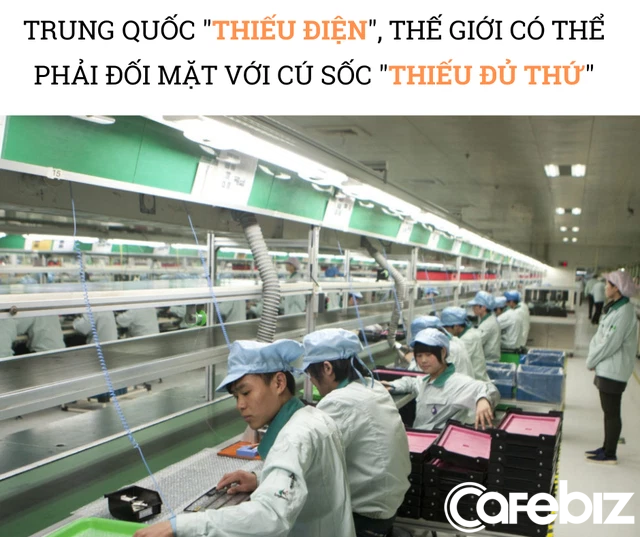China ‘short of electricity’, the world received a shock of ‘lack of everything’: Factories only operate 3 days a week, some places are temporarily closed, the global supply chain becomes a ‘mess’
- Tram Ho
CNN reports that the growing power supply crisis in China is causing power outages for households and forcing factories to cut output. This not only threatens to slow down economic growth, but also puts further strain on global supply chains.
Chinese state media have reported that companies in the country’s industrial heartlands have been asked to limit energy consumption to reduce electricity demand.

According to the Global Times, an “unexpected and unprecedented” power cut occurred in three northeastern provinces on Monday. The newspaper reported a day later that rotating power cuts in the provinces of Heilongjiang, Jilin and Liaoning had “led to major disruptions to people’s daily lives and business activities”.
Power shortages are also affecting Guangdong province, a major industrial and shipping hub. Local officials said on Monday that many companies are trying to reduce electricity demand by having employees work two or three days a week.
China’s State Grid Corporation on Monday said it would “dive all its strength to fight the uphill battle over power supply”, doing its best to ensure people’s consumption needs.

China was hit by a similar energy crisis in June, but the situation is getting worse. The country’s industries are facing enormous pressure from soaring energy prices and Beijing’s handling of carbon emissions.
The Chinese side is trying to meet its pledge that its carbon emissions will peak by 2030. That requires provinces to use less fossil fuels per unit of economic output, for example. term by burning less coal to generate electricity. At the same time, demand for Chinese-made goods is growing as the global economy gradually recovers from the pandemic. Result: Power shortage becomes severe.
Major international suppliers are bracing for delays due to shortages and global shipping delays.
Pegatron, a company that makes components and assembles iPhones for Apple, said Tuesday that it is following “Chinese government policies to enable energy-saving mechanisms and reduce output.” . Pegatron has a large factory in the eastern Chinese city of Kunshan, where the government is restricting electricity supply.
Rotating power cuts could create new headaches for the tech supply chain, although they may not be as severe as the worldwide shortage of computer chips, according to Dale Gai, director of Counterpoint Research. affects everything from cars to washing machines to other electronic devices.
Outages in areas where smartphone assembly plants are located may result in some short-term delays.
“There could be a component delivery delay of a week or so. Things are still being managed, it’s just going to be a delay,” Gai said.
“A MESS”
It’s worth mentioning that the disruption comes as manufacturers and shippers race to fill demand for everything from clothes to toys for the year-end shopping season.
Chinese manufacturers warn that stringent electricity-use cuts will reduce output in economic locomotives such as Jiangsu, Zhejiang and Guangdong provinces – which account for almost a third of the total. the country’s domestic product – and can increase the price of the product.
Clark Feng, owner of Vita Leisure Company, which buys tents and furniture from Chinese manufacturers and then sells them abroad, said the restriction on electricity use in Zhejiang province, where the company is based, said: dealt a heavy blow to them. Fabric manufacturers in the province, whose production has stalled, have begun to raise prices and postpone receiving new orders abroad, he said.
“We’ve had a hard time shipping overseas, and now with limited production capacity, it’s definitely going to be a big mess. We’ve had to deal with a lot of problems,” said Feng. Many factors are uncertain and now there is one more. It will be harder to deliver orders, especially during the festive season.”
Yiwu Huading Nylon, a synthetic nylon producer in Zhejiang, has suspended half of its production capacity since September 25 following a local government order to cut electricity consumption. The company expects output to gradually recover from October 1, and said it will seek to mitigate the impact of the temporary shutdown.

Chen Yubing, director at Berya Textile Technology, a synthetic fiber export company in Zhejiang, said the company’s production lines were only allowed to operate three days a week starting in early September. The company’s sales come from foreign customers. “We’ve had problems delivering some orders,” said Chen. “All we can do now is wait and negotiate with the customer.”
“SHOCKING” WITH GROWTH
The shock is even causing economists to cut their growth expectations this year for the world’s second-largest economy.
Analysts at Nomura cut their China growth forecast for 2021 to 7.7% on Friday, citing an “increasing number of factory shutdowns” due to demand reductions in consumption. local energy consumption or power outages due to rising coal prices and shortages.
Analysts at Goldman Sachs also cut their 2021 GDP growth forecast for China to 7.8% from 8.2%, citing “recent production cuts across a range of industries. industry using high energy”.
They noted that “significant uncertainty” began in the last quarter of the year, as the Chinese economy was already exposed to risks because of the debt crisis at Evergrande.
The problem of energy supply is not new to China. In the summer of this year, several Chinese provinces warned of power shortages during the country’s worst electricity crisis since 2011.
But the latest reports are even more worrisome. State broadcaster CCTV reported that severe power shortages in the northeast regions will “continue for some time”.
The hottest topic about China will soon change from “Evergrande” to “Lack of electricity”.
China escaped the economic downturn caused by the pandemic in large part thanks to a construction and manufacturing boom. However, real estate projects and factories require huge amounts of energy to operate, and that equates to a huge amount of coal that needs to be used.
“The Chinese economy is driven more by the industrial sector than by the consumer sector. Unfortunately, the energy intensity in the public sector is very high,” Macquarie economist Larry Hu wrote in a research note on Monday. much higher in the industry than in the consumption sector.
Meanwhile, the post-pandemic commodity boom and ambitious climate goals have sent coal prices soaring, driven by rising demand and falling mining. Hu pointed out that the price of thermal coal – mainly used to generate electricity – has increased this year from 671 yuan ($104) a tonne to about 1,100 yuan ($170).
Lu Ting, chief economist at Nomura Holdings, said: “Global markets will feel supply shortages across fronts ranging from textiles to toys to machinery components. The hottest topic is China. will soon switch from ‘Evergrande’ to ‘lack of power'”.
“No one knows when the supply chain bottleneck will be fixed. But the situation looks very ominous for this winter,” said Hao Hong, head of research and chief strategist at Bocom International.
Source : Genk
